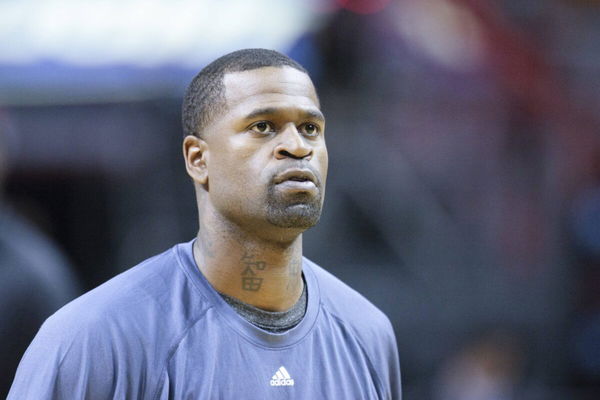
Imago
Bildnummer: 06891370 Datum: 19.11.2010 Copyright: imago/PanoramiC BASKET : NBA – Bobcats vs Heat – 19/11/2010 19 November 2010: Charlotte Bobcats shootingguard – 1 Stephen Jackson practices prior to the Miami Heat 95-87 victory over the Charlotte Bobcats at the AmericanAirlines Arena, Miami, Florida, USA. ChristopheElise/Panoramic PUBLICATIONxNOTxINxFRAxITAxBEL; xo0x Basketball Herren USA NBA Porträt vdig xng 2010 quer

Imago
Bildnummer: 06891370 Datum: 19.11.2010 Copyright: imago/PanoramiC BASKET : NBA – Bobcats vs Heat – 19/11/2010 19 November 2010: Charlotte Bobcats shootingguard – 1 Stephen Jackson practices prior to the Miami Heat 95-87 victory over the Charlotte Bobcats at the AmericanAirlines Arena, Miami, Florida, USA. ChristopheElise/Panoramic PUBLICATIONxNOTxINxFRAxITAxBEL; xo0x Basketball Herren USA NBA Porträt vdig xng 2010 quer
There’s a point in life when you realize it’s not about how much you do, but who you’re doing it for. For Stephen Jackson, that moment came when everything looked like it was working, until it wasn’t. You might know him from his NBA Pacers time or the “All The Smoke” podcast. But the story behind how he landed there is way deeper than just basketball or media. It’s about knowing when to let go of side missions that were never his to carry.
Watch What’s Trending Now!
In a recent sit-down on Above The Rim with DH 12, hosted by Dwight Howard, Stephen Jackson peeled back the layers on how he found clarity through chaos. The conversation got raw when Dwight’s co-host asked about the courage it took for Stephen Jackson to just “say f**k it” and follow his own path, especially after being blocked in the league for doing skits or keeping it real online. “That was always my attitude anyway,” Stephen said. “We all want to be MJ or Kobe, but that ain’t the role for everybody.” He admitted he was chasing a dream that wasn’t fully his… partying, showing off, and it cost him chances at All-Star games and more.
But then, something shifted.
Out of nowhere, Rachel Nichols called him to co-host The Jump on ESPN. From there, he was one of the first to work for FOX and ESPN at the same time. Then came the podcast game. “Matt [Barnes] said, ‘Jack, you wanna do a podcast?’ I said, ‘What’s that?’ I didn’t even know what a podcast was,” Stephen Jackson laughed. But he jumped in, just being himself, and it exploded. “We started with Showtime, then Paramount bought them, and now we own Showtime Boxing—All The Smoke Fight,” he said. That’s not just content, that’s legacy. That’s ownership.
And here’s the kicker… he walked away from other dreams to get here. One of those was his record label, Secret Society Entertainment. “I was blessing people with my blessing that God didn’t intend to bless,” he said. He talked about going back home and starting things for people who were always in trouble, hoping to pull them out. But in doing that, he lost focus on the people who were actually there for him. “I should have been blessing more of my family,” he admitted. “Everybody can’t go.”

Imago
Jul 26, 2022; New York, NY, USA; Stephen Jackson poses at the NYC Point Gods Premiere at The Midnight Theatre. Mandatory Credit: Jessica Alcheh-Imagn Images
That’s where things got real. Dwight added, “People get upset when you’re doing more for the wrong ones than the right ones.” Jackson nodded in agreement, saying he learned the hard way that you gotta fill your own cup first. He chased rap, helped friends, invested in dreams that weren’t his, and none of it clicked. “God’s gonna force you to sit down, bro,” Stephen Jackson said. And when he did? Everything changed.
Stephen Jackson: The story behind the man
Stephen Jackson’s story didn’t begin with a microphone or a basketball. It all began in the middle of Port Arthur, Texas. “50,000 people, eight sets of projects, two high schools. Everybody’s doing the same thing,” he said, painting the picture of a place where survival often trumped success. Stephen Jackson wasn’t just in the mix, he was deep in it. “I was out there bad, yo,” he admitted, reflecting on nights he never came home and days he skipped school to hustle in the streets.
Growing up in a neighborhood where red bandanas meant something more than just fashion, Stephen Jackson got pulled into street life early. “Everybody selling drugs and everybody hanging out,” he said. He repped the “3200 Block,” ran with local gangs, and even got in trouble with the law. But people saw his gift and tried to protect it. Protect him, from himself. “Sometimes I got pulled over with [drugs], and they let me go because of who I was,” he recalled. “If I was in Houston or L.A., that would have been the end of me.”
So what saved him? Family. People who cared. “I had my grandmother, my aunts, my mom, telling me, ‘What are you doing? That’s not you,’” he said. It took those voices to pull him back before the streets pulled him under. And even though he had one foot in the streets, the other was slowly finding grip on the court. That’s what made him different… he had talent and along with that, he had a community… people who cared enough.
Still, that old life didn’t disappear when he made it. Even during his NBA years, Stephen Jackson carried the weight of where he came from. He kept trying to lift others with him. “I went back home, finding n****s that was in trouble their whole life and trying to help them and start record labels,” he said. But that didn’t always go right. “If God wanted to bless these people, he would’ve blessed them before me,” he added with honesty. He realized too late that just because you came from the same place doesn’t mean you’re meant for the same path!

